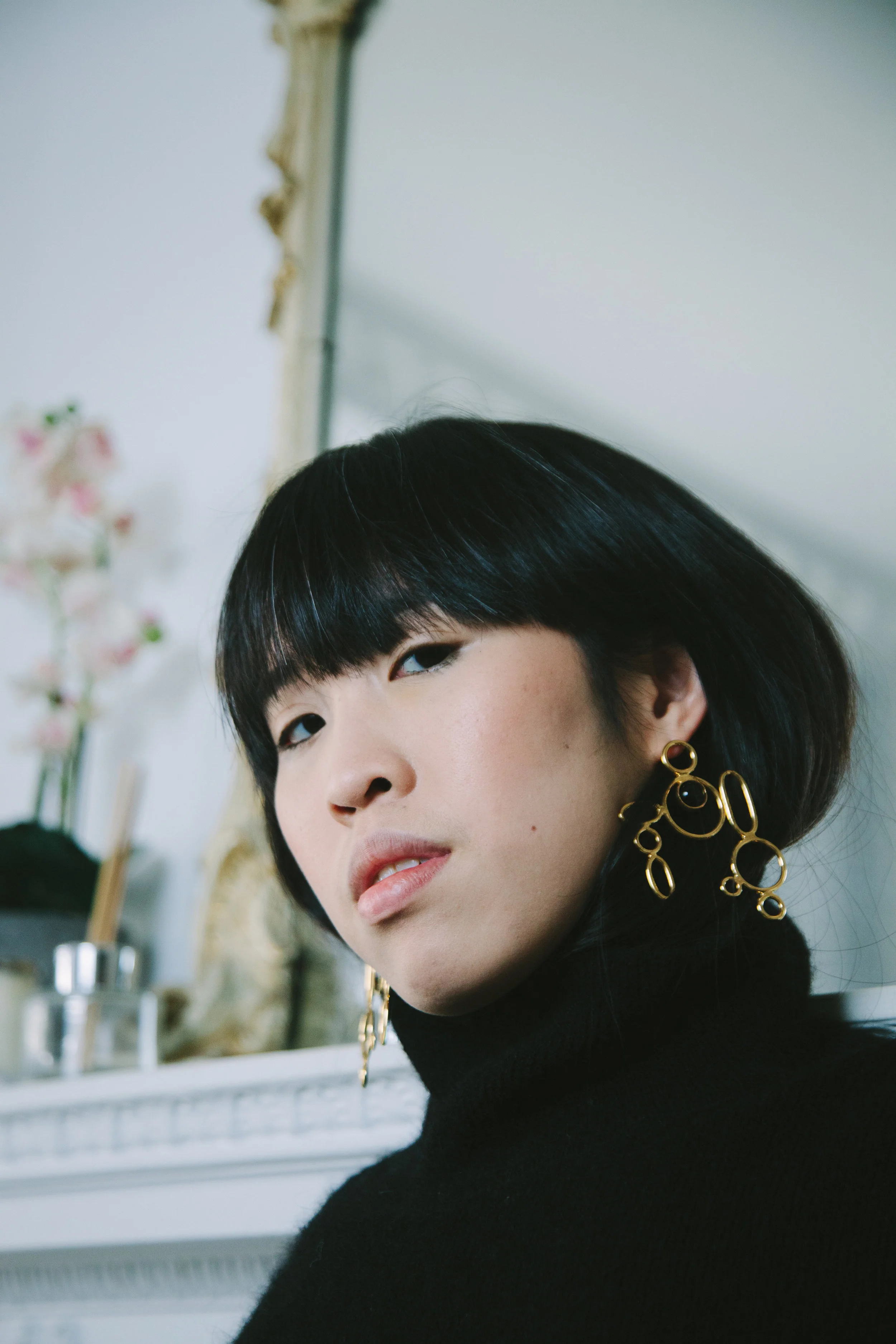By nature, journalism can often be caught up in tomorrow's stories, but Zing Tsjeng’s vision remains unrestricted by the same contemporaneity. Highlighting women who have been left out of mainstream history narratives, Zing has developed an encyclopaedic knowledge of the forgotten legacies of women whose stories she is determined to tell.
photography Emmanuel Robert
styling + words Chinasa Chukwu

On Her Career and Journalism
What made you get into journalism?
To be honest, I was always interested in writing, but I never thought I would be a journalist until I did my student newspaper and then won a prize for student journalism from the Guardian and then thought “oh maybe there is a career in this” because up until then I just looked at it as a fun hobby.
And then I did a masters in Journalism, because I’m the kind of person who is always looking for a course I can do to make myself better, because its a little scary. And then I started working in fashion magazines. My first job was at Wonderland and then I went to Dazed, after which I had the really short job at a pop culture site called Combini where I worked before joining the Broadly team.
What kind of journalism were you doing for the fashion magazines?
At Wonderland, I was the online editor but this was way back in 2012, when Twitter and Instagram were just starting out and everyone was still putting stupid filters on everything. They basically gave me free reign to do their social media and their website, which was really good experience at the start of your career. After that I went on to do online news for Dazed and Confused, so I did lots of breaking news and fashion coverage.
How did you become the editor of Broadly?
When Broadly was first starting up they wanted a UK base as well as a US one. So I was basically headhunted to join the team. That was a really cool experience and when they approached me, I kind of um’ed and ah’ed as I had literally just started in another new job, but at the end of the day I knew it was the right decision.
What made you decide to go with Broadly?
It was just such a cool idea to start up a brand new women’s publication. It just hadn’t been done in the way they wanted to do it for so long, with so many cool documentaries, great videos and amazing journalism.
Was that part of the mandate from the beginning? To publish really diverse content from diverse voices?
100%. It’s really interesting because I feel like a lot of other places have now caught up with us, as people are realising that you can’t just publish for a very small pool of women. So in a way we’ve been proven right.
We’ve been hearing a lot of chatter about opinion essays and women, and specifically women of colour having to mine their own personal experiences for content and publications, because there isn’t as much space in publishing anymore. Is it something you’re conscious of?
Yes, I mean when I started out in journalism, I definitely felt the pressure to think about what I could write about from a personal perspective or an essay about my opinions but actually as I’ve gotten more experience I realise there is only so much you can give as a writer. There are some writers who are really good at it and they have ways of turning everyday experiences into something so relatable and literary and it’s a joy to read but I don’t think I could do that. Also, with experience I realise that the skills I value as a journalist don’t really have anything to do with me as a person but more how I relate to other people, like how to be a good listener and how to make other people feel comfortable with you so they can open up in interviews, that’s what I really value in journalism.

On Forgotten Women
Do you feel like the need to show something different inspired the Forgotten Women series?
Yes definitely, because all the stories feel really new and contemporary even though some of them are literally thousands of years old because no-one has heard of them unless you are a specialist academic - most of the names would be new names. Even for me, and I would consider myself quite clued up on history. For a lot of the women that we picked, at first I was like ‘this story sounds amazing, but I have no idea who this is’. We picked the women with the help of an organisation called The New Historia, which is an academic project from The New School: Parsons. It is run by a women’s history professor and it is devoted to making sure women in history aren’t forgotten, so we worked with her to select the roll call of women which was a really interesting process. From there I worked with the publisher to make sure the list was as diverse and representative as possible because I didn’t want it to just be women from America or England and I obviously didn’t want it to just be white women. It was really important to me that it was representative of women history across the world, not just in Europe or across the West.
When you started thinking about the idea, was it something you came up with or were you approached by a publisher?
I was initially approached by my publisher, who was interested in doing something in women’s history and they had the kernel of an idea, so we worked on it together and it eventually became Forgotten Women. I was adamant that I didn’t just want it to be a list of women, I wanted there to be a story told from page one to the final page of women who had been doing things throughout history. You can see it in the way the chapters are laid out, at least with the Leaders, it ends with people who were involved with the civil rights era which was really important to me as I wanted it to feel like you were dipping in and out of this big, existing narrative.
Speaking about women rights and equality has become such a big topic over the past few years again. Is Forgotten Women something you felt had to be done right now or did you feel like it could have existed five or ten years ago or five or ten years in the future?
No, I feel like we are in a really unique moment now. I always reference this tweet that went viral last year “name a bitch badder than Taylor Swift” and so many people came back saying “what about this woman, what about this woman”, and they were all referencing women from history. I don’t think that would have happened five years ago because people wouldn’t have reacted to it in the same way. So I think we are in a really unique moment now because there is a real hunger to know more about these kinds of things. There is the newfound openness to new ideas and to critiquing things that we assumed or latched on to in the past. You can see it with something like the British Empire because now people are thinking ‘hey it wasn’t so great’ and I think that is very much now. Maybe it was happening in academia but now it’s mainstream and I think it also applies to women’s history. People were maybe not so interested a couple of years ago but now they really are, so these books are the perfect books for our times because they speak to what a lot of people want to learn about now.
Read the rest of the interview in POSTSCRIPT Issue 1.
